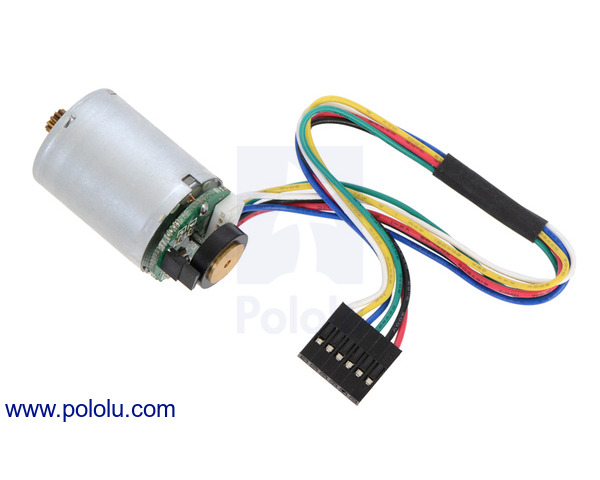LP 12V Motor with 48 CPR Encoder for 25D mm Metal Gearmotors (No Gearbox, No End Cap)
This is the motor and encoder portion of our low-power (LP), 12V 25D mm metal gearmotors with 48 CPR encoders. It does not include a gearbox, but the pinion gear on the output shaft works with all of our 25D mm gearmotor gearboxes, so this can be used as a replacement motor or encoder for those gearboxes.
Key specifications:
| voltage | no-load performance | stall extrapolation |
|---|---|---|
| 12 V | 5600 RPM, 20 mA | 0.15 kg⋅cm (2 oz⋅in), 1.1 A |
You can use the following selection boxes to choose from all of our 25D metal gearmotor versions:
Alternatives available with variations in these parameter(s): gear ratio motor type encoders? Select variant…
| Description | Specs (13) | Pictures (5) | Resources (2) | FAQs (1) | On the blog (0) | Distributors (0) |
|---|
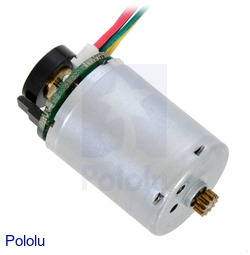 |
Overview
This motor with integrated 48 CPR (counts per revolution) quadrature encoder is intended as a replacement low-power (LP) 12 V motor with encoder for our 25D mm metal gearmotors. It is intended for use at 12 V, but in general, these kinds of motors can run at voltages above and below this nominal voltage. Lower voltages might not be practical, and higher voltages could start negatively affecting the life of the motor.
The output shaft has a non-removable pinion gear that works with all of our 25D mm gearmotor gearboxes. Note that we do not sell the 25D mm gearboxes separately, but if you have a gearmotor with a damaged motor or encoder (or if you want to effectively add an encoder to a version without an encoder), you can transfer the gearbox to this replacement motor.
The motor has a diameter of 24.2 mm (0.95 in) and a length of approximately 43 mm (1.7 in) from the top of the motor can to the bottom of the encoder. The top of the motor has two mounting holes threaded for M3 screws. These mounting holes are 17 mm apart and form a line with the motor shaft at the center. The mounting holes have a depth of approximately 6.5 mm.
Other motor windings with identical dimensions and pinion gears are also available, resulting in five total options:
- High-power 6 V motor with encoder
- Low-power 6 V motor with encoder
- High-power 12 V motor with encoder
- Medium-power 12 V motor with encoder
- Low-power 12 V motor with encoder (this product)
Pinion gear specs
- Metric with module m = 0.4
- Number of teeth: 12
- Face thickness: 2.5 mm
- Pressure angle: 20°
- Gear position: 4.5 mm from top of motor to top of gear
As of 13 December 2017, we have switched to using a more durable, alloy steel pinion gear with this motor. Units shipped before this date had copper pinion gears.
Gearmotor options
You will typically want to combine this motor with a gearbox to give it a more appropriate combination of torque and speed (without a gearbox, it offers very high speed with very low torque). The LP 12V versions of our 25D mm metal gearmotors consist of this motor combined with different gearboxes. We do not carry the gearboxes by themselves, so unless you are looking at this as a replacement motor for a compatible gearbox you already have, we strongly recommend you consider getting a preassembled gearmotor with the gear ratio that best suits your project requirements.
Note: Stalling or overloading gearmotors can greatly decrease their lifetimes and even result in immediate damage. For these gearboxes, the recommended upper limit for instantaneous torque is 15 kg-cm (200 oz-in); we strongly advise keeping applied loads well under this limit. Stalls can also result in rapid (potentially on the order of a second) thermal damage to the motor windings and brushes, especially for the versions that use high-power (HP) motors; a general recommendation for brushed DC motor operation is 25% or less of the stall current.
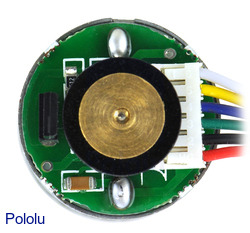 |
25D mm metal gearmotor with 48 CPR encoder: close-up view of encoder. |
|---|
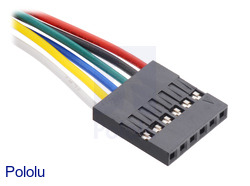 |
Using the encoder
A two-channel Hall effect encoder is used to sense the rotation of a magnetic disk on a rear protrusion of the motor shaft. The quadrature encoder provides a resolution of 48 counts per revolution of the motor shaft when counting both edges of both channels. To compute the counts per revolution of the gearbox output, multiply the gear ratio by 48. The motor/encoder has six color-coded, 11" (28 cm) leads terminated by a 1×6 female header with a 0.1″ pitch, as shown in the main product picture. This header works with standard 0.1″ male headers and our male jumper and precrimped wires. If this header is not convenient for your application, you can pull the crimped wires out of the header or cut the header off. The following table describes the wire functions:
| Color | Function |
|---|---|
| Red | motor power (connects to one motor terminal) |
| Black | motor power (connects to the other motor terminal) |
| Green | encoder GND |
| Blue | encoder Vcc (3.5 – 20 V) |
| Yellow | encoder A output |
| White | encoder B output |
The Hall sensor requires an input voltage, Vcc, between 3.5 and 20 V and draws a maximum of 10 mA. The A and B outputs are square waves from 0 V to Vcc approximately 90° out of phase. The frequency of the transitions tells you the speed of the motor, and the order of the transitions tells you the direction. The following oscilloscope capture shows the A and B (yellow and white) encoder outputs using a motor voltage of 6 V and a Hall sensor Vcc of 5 V:
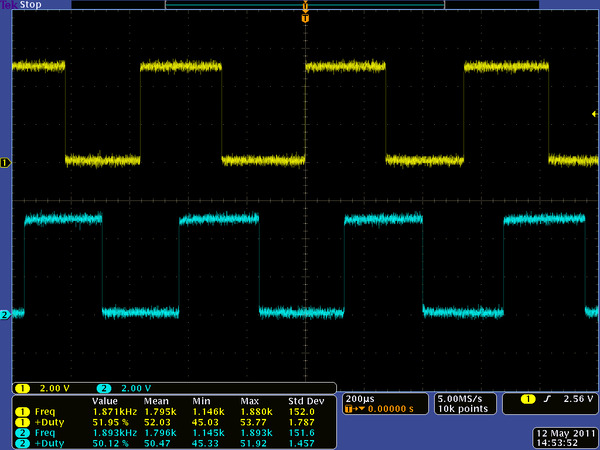 |
Encoder A and B outputs for 25D mm HP 6V metal gearmotor with 48 CPR encoder (motor running at 6 V). |
|---|
By counting both the rising and falling edges of both the A and B outputs, it is possible to get 48 counts per revolution of the motor shaft. Using just a single edge of one channel results in 12 counts per revolution of the motor shaft, so the frequency of the A output in the above oscilloscope capture is 12 times the motor rotation frequency.
Selecting the right gearmotor
We offer a wide selection of metal gearmotors that offer different combinations of speed and torque. Our metal gearmotor comparison table can help you find the motor that best meets your project’s requirements.
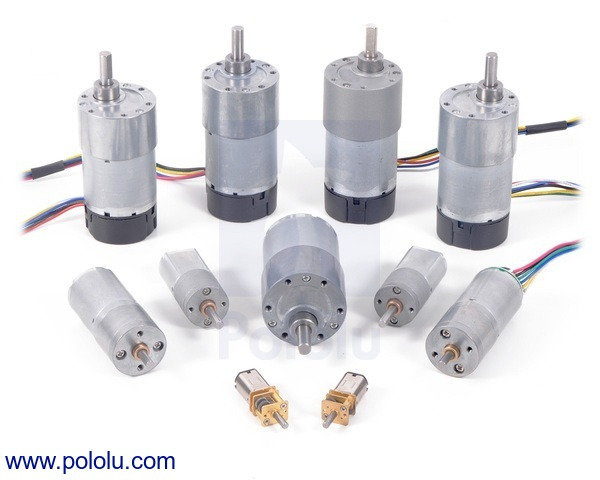 |
